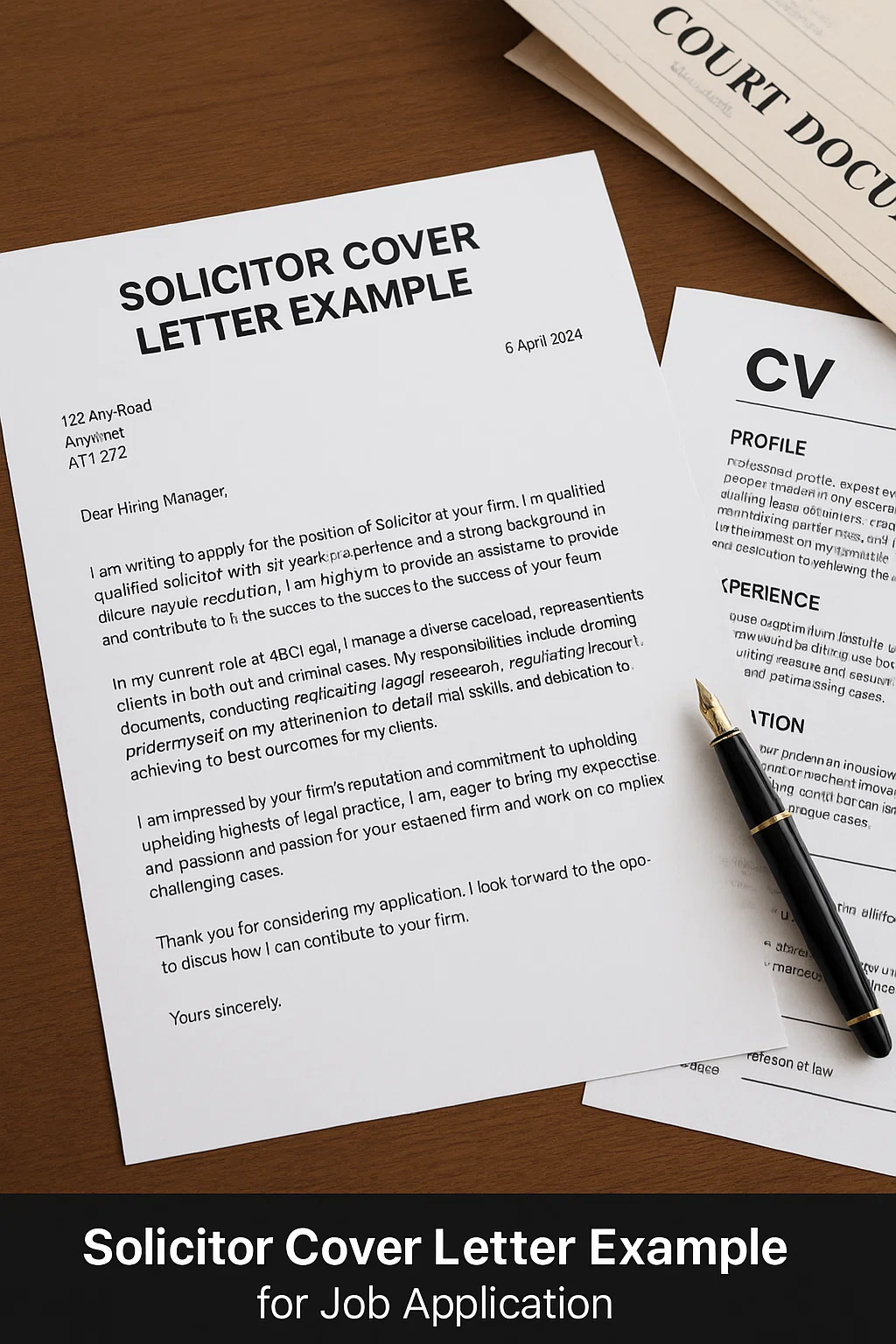That single page that can either open doors or quietly land you in the “maybe later” pile.
Don’t panic. Most people overcomplicate it. A legal cover letter isn’t about stuffing in fancy words or quoting every statute you’ve ever read. It’s about showing you get it that you understand the job, the firm, and what it means to think like a lawyer.
Let’s take this step by step.
Why a Legal Cover Letter Still Matters in 2025
Some people think cover letters are dead. “Surely recruiters don’t read them anymore, right?”
Wrong.
According to 2025 data from major UK recruitment sites like Reed and Indeed, over 70% of law firms still require a cover letter for training contracts, internships, and graduate roles.
Why? Because in law, how you write matters as much as what you know. Your cover letter is your first mini-case: it demonstrates logic, clarity, and persuasion three things every solicitor or barrister needs.
Think of it as your opening statement to the jury. You’ve got one page to make them believe you belong in their chambers or firm.
And here’s the thing: you don’t need to sound like a textbook. You just need to sound like you only more structured and intentional.
The Anatomy of a Strong Legal Cover Letter
Every brilliant cover letter follows a rhythm. Not a template, but a logical flow that feels natural. Here’s the anatomy most UK legal recruiters expect:
1. Header
Start with your name, contact details, and date at the top left. Include the firm’s address below it yes, it looks old-school, but legal recruiters still value formality.
If you’re emailing, that header sits neatly in your signature instead. Keep it tidy and consistent with your CV.
2. Opening Line
Don’t waste it with “I am writing to apply for…” They already know that.
Instead, hook them. For example:
“During my recent placement at Clifford Chance, I realised how much I value problem-solving within commercial law and that’s exactly what drew me to your firm.”
That’s how you catch attention: by connecting what you’ve done with what they do.
3. Body Paragraphs
Two or three paragraphs max. Each should tell a small, clear story.
- Paragraph 1: Why you’re drawn to the firm or role (specific, not generic).
- Paragraph 2: What experience you bring (evidence, not fluff).
- Paragraph 3: Why you’re a cultural fit (values, teamwork, curiosity).
4. Closing
Reinforce enthusiasm and professionalism. Something like:
“I’d welcome the opportunity to discuss how my background in dispute resolution and client advocacy could add value to your litigation team.”
Then sign off formally:
Yours sincerely (if you know their name)
Yours faithfully (if you don’t).
How To Start Your Cover Letter (Without Sounding Robotic)
The first line is where most people panic. You can almost hear the keyboards pause before typing:
“Dear Sir/Madam…”
Nope. Stop right there.
If you can, always find a name. Look at the firm’s graduate recruitment page or LinkedIn. Even if it’s “Dear Ms Patel” or “Dear Mr Lawson,” that small detail shows effort.
Then, your opening sentence. Forget the clichés like “I am writing to express my interest…” Instead, use energy and purpose.
Examples:
- “As a final-year LLB student at King’s College London, I’ve spent the past year immersed in commercial dispute law and am eager to build on that foundation through your summer scheme.”
- “Your firm’s commitment to pro bono work immediately stood out to me, as I’ve volunteered for Legal Aid Scotland for two years.”
See? Both examples start with something personal and relevant. It’s professional but human exactly what recruiters want.
Writing With No Experience? Here’s What to Highlight
Let’s be real most law students don’t have a stack of legal jobs yet. And that’s completely fine. Recruiters aren’t expecting ten cases under your belt; they’re looking for potential.
Here’s what counts (even if it doesn’t sound “legal” at first):
- Moot court or debate club: demonstrates advocacy and logical thinking.
- Part-time retail job: shows client interaction and responsibility.
- Essay competitions or legal blogs: highlight written communication skills.
- Volunteering or student society roles: showcase teamwork and initiative.
When you write your letter, translate these experiences into the language of law. For example:
“As president of the Debate Society, I learned to analyse arguments under pressure and communicate persuasively skills I aim to bring into client discussions at your firm.”
Suddenly, your extracurriculars become evidence of employability.
Training Contract & Solicitor Cover Letter Examples
Let’s make this practical. Here are mini examples based on real legal cover letter styles used in the UK:
Example 1 – Law Graduate Training Contract
Dear Ms Harper,
My final-year dissertation on the regulation of fintech companies introduced me to your firm’s innovative work in corporate law. I was particularly drawn to your advisory team’s involvement in UK-EU compliance frameworks areas I’m keen to pursue after graduating.
During my internship at a boutique London firm, I gained hands-on experience preparing client briefings and assisting with due diligence for mergers. These tasks honed my attention to detail and my ability to interpret complex legislation efficiently.
I’m especially inspired by your firm’s focus on technology and data protection, and I’d be excited to contribute to that growing area through your training contract programme.
Yours sincerely,
Emily Jackson
Example 2 – Solicitor with Limited Experience
Dear Mr Bennett,
After completing the LPC at BPP University, I’ve developed a keen interest in employment and civil litigation, both areas in which your firm has earned recognition. My experience shadowing barristers at the Royal Courts of Justice gave me invaluable exposure to case preparation and witness handling.
Outside academics, I’ve volunteered with Citizens Advice, supporting clients through employment tribunal claims. The work deepened my understanding of fairness, procedure, and advocacy values I see reflected in your practice.
I’m eager to bring my analytical skills and enthusiasm for client service to your trainee solicitor team.
Yours sincerely,
James Anderson
Both examples are clean, believable, and specific exactly what legal recruiters expect.
Formatting Rules Recruiters Actually Notice
You’d be amazed how many good candidates lose points for poor formatting. In law, presentation is persuasion.
Here’s how to keep it tidy:
| Element | Best Practice (UK Legal Standards) |
|---|---|
| Font | Times New Roman, Arial, or Calibri |
| Font Size | 11–12 pt |
| Line Spacing | 1.15 or 1.5 |
| Length | Max one A4 page (around 350–450 words) |
| File Format | PDF (keeps layout intact) |
| File Name | FirstName-LastName-CoverLetter.pdf |
Avoid bold fonts everywhere. Use spacing to breathe. Recruiters often skim your letter in under 60 seconds, so structure is everything.
And yes grammar. Double-check every comma. One small typo in a legal letter screams carelessness.
The Smart Way to Align Your Letter With a Legal CV
Your cover letter and CV aren’t two separate worlds they’re a conversation.
Think of your CV as the evidence list and your cover letter as the closing argument. The letter should reference a few items from your CV, not rehash it word-for-word.
For example:
CV: “Legal Assistant at Brown & Co Solicitors – drafted client letters, maintained case files.”
Cover Letter: “At Brown & Co, I improved document turnaround time by developing a structured filing process, which freed senior solicitors for client-facing work.”
That’s how you connect the dots. It shows awareness and reflection skills every law firm values.
Common Mistakes Law Graduates Keep Making
Let’s save you from the pitfalls most graduates fall into.
Here’s the list of repeat offenders:
- Copy-pasting the same letter to multiple firms. Recruiters can smell it. Always tailor each one mention specific practice areas or cases.
- Sounding too formal or stiff. Legal doesn’t mean lifeless. Write like a professional human, not a robot in a wig.
- Overusing legal jargon. Using “therein,” “herewith,” or “pursuant to” won’t make you sound smarter it’ll make you sound outdated.
- Listing achievements without context. Don’t just say “I’m a team player.” Explain where you demonstrated that.
- Forgetting your motivation. Recruiters want to know why this firm, why this area, why now.
The goal? Clarity, not cleverness.
If a friend who’s not in law can read your letter and still feel impressed, you’ve nailed it.
Your Mini Checklist Before Sending It Out
Before you click send, run through this:
✅ Did I address the letter to a real person?
✅ Is it under one A4 page?
✅ Have I tailored it to the firm’s specialisation?
✅ Did I show genuine motivation not just career necessity?
✅ Is my tone confident, not arrogant?
✅ Have I proofread it three times (ideally out loud)?
✅ Is my CV attached with matching formatting?
Bonus tip: save a copy of every letter. When you get interviews, you’ll want to reread what you sent.
What to Do If You Have Gaps or Non-Legal Background
If your background isn’t purely legal say you worked in finance, education, or hospitality own it. Those experiences show perspective.
Frame it like this:
“My time managing a retail team taught me the importance of handling confidential client data responsibly an ethic I carry into legal practice.”
Law firms love transferable skills. What matters is how you connect them to the work you want to do.
How Long Should a Legal Cover Letter Be?
Here’s the short answer: one page. Always.
The long answer? Legal recruiters read hundreds of applications. Anything over 500 words risks skimming.
Stick to 350–450 words, formatted neatly. Think sharp, not shallow.
If you’re unsure, imagine you’re the hiring partner reading your letter on the train. Would you still care after the second paragraph? If not trim it.
The Power of Research: How To Personalise Smartly
This is where most cover letters go from average to “wow.”
Before you write, spend 15 minutes researching:
- Recent cases or transactions the firm handled
- Their main practice areas (commercial, family, IP, etc.)
- Awards, publications, or initiatives (like pro bono or sustainability projects)
Then reference them lightly:
“I was impressed by your firm’s involvement in the Smith v. Green environmental litigation, as it reflects a commitment to social responsibility that aligns with my own interests.”
One sentence like that shows effort and sets you apart instantly.
Adding a Bit of Personality (Without Crossing the Line)
It’s okay to sound like a human. In fact, it’s encouraged.
Here’s what works:
- Mentioning genuine motivations: “I’ve always been fascinated by how the law adapts to technology.”
- Showing real voice: “What excites me most about law is how it blends logic with empathy.”
Here’s what doesn’t:
- Jokes, emojis, or overly casual lines.
- Oversharing personal stories that aren’t relevant.
Keep it warm, confident, and articulate the sweet spot between friendly and formal.
What Recruiters Say (Real 2025 Insight)
A few hiring partners from UK firms shared that what catches their eye isn’t perfection it’s personality with precision.
They want someone who:
- Understands the firm’s focus areas
- Communicates clearly and professionally
- Shows motivation without sounding desperate
- And writes like they’ll represent the firm well in front of clients
That’s it. You don’t need a fancy vocabulary. You just need to sound like the kind of person clients would trust.
The Quick Polish Routine
Before sending:
- Read it aloud. You’ll instantly spot clunky phrasing.
- Run a grammar check, but don’t let it kill your tone.
- Print it once errors hide in plain sight on screens.
- Ask a friend to read it; if they get bored, shorten it.
- Save a master copy for future tailoring.
Remember: your cover letter isn’t just an admin formality. It’s your voice your argument for why you belong.
Final Word – Make It Human, Not Generic
Law is built on detail, logic, and empathy. And your cover letter should reflect all three.
Whether you’re a first-year student or a graduate chasing that first training contract, your story matters. Write it like you’re telling someone why law excites you not why you need a job.
Because that difference? Recruiters feel it.
If your words show curiosity, care, and clarity, you’ll stand out not because you were perfect, but because you were real.
And in the legal world, that’s exactly the kind of persuasion that wins cases… and careers.

Rachel combines her technical expertise with a flair for clear, accessible writing. A graduate of the University of Edinburgh, she specializes in creating detailed tech-focused content, Govt Jobs, Payslips that educates our readers about the latest in web development and SEO tools at Spinbot blog.

